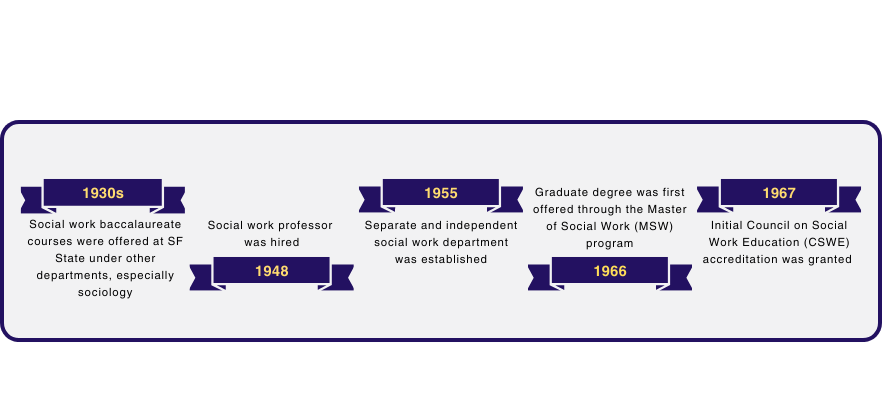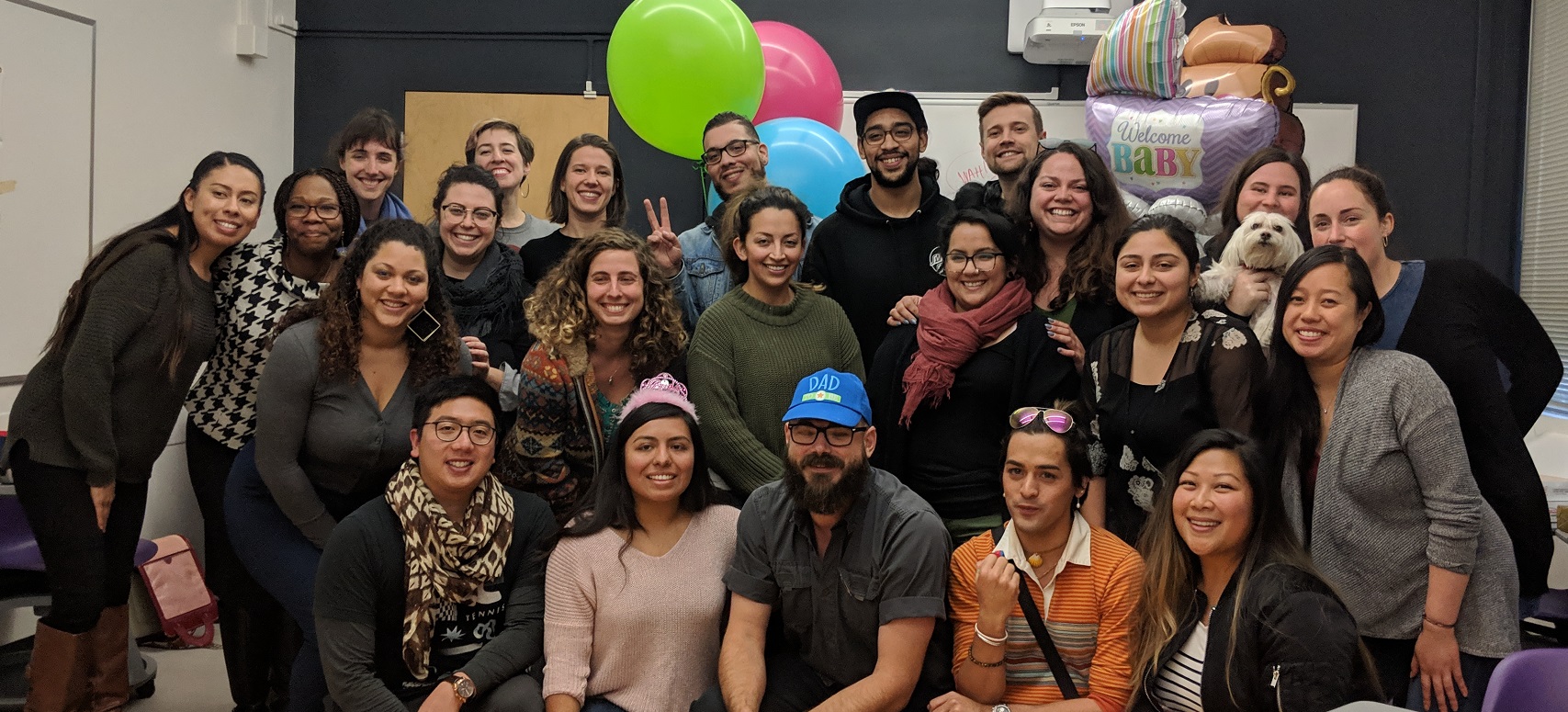The Students, Staff, Alumni, and Faculty of the School of Social Work welcome your interest in the BASW and MSW programs!
We are a community of social justice social work practitioners committed to one another’s ongoing professional development.
In classrooms, internships, and professional service positions, we collaborate to build foundational knowledge application and use of self skills for assisting people dealing with difficult life situations and for facilitating social justice focused social change.
Our support and advocacy for others is based upon:
- client self-determination informed responsiveness to life experience, identity perspective, and aspirational personhood, as well as
- critical social theory, anti-racist practice analysis, and inclusive strategic activism. Please consider joining our search for ways of working together and serving others.
I welcome you to contact us for questions and suggestions, socwork@sfsu.edu.
Yeon-Shim Lee,
Interim Director and Professor
The mission of the San Francisco State University School of Social Work is to educate diverse learners to achieve progressive development and promote social change throughout the Bay Area and beyond. The School of Social Work cultivates ethical leadership for social justice and teaches professional advocacy, versatility, activism, and anti-racist practices.
The Bachelor of Arts in Social Work (BASW) and Master of Social Work (MSW) degrees at San Francisco State University is fully accredited by the Council on Social Work Education (CSWE), which is located in Alexandria, Virginia, since 1967.
Reaffirmation of accreditation is required every 8 years. The last CSWE reaffirmation of accreditation was granted in 2018, and it runs to 2026.
For more information about social work accreditation at SF State, you may contact Council on Social Work Education Office on Accreditation.
Cognitive Domain: Achieve highest levels of knowledge, comprehension, application, analysis, synthesis, evaluation, and creation.
Affective Domain: Engage and sustain well-developed abilities and skills to receive, respond to, value, organize, and internalize diverse phenomena. (Adapted and applied from Benjamin Bloom’s taxonomy of cognitive and affective domains)
- Education: Learn from and apply the rigorous SF State social work education that achieves the nine Council on Social Work Education (CSWE) curricular competencies at the graduate (MSW) level. Utilize education and research to inform and effectively engage in practice at micro (individuals, families, and groups), mezzo (organizations, institutions, and communities), and macro (societies and international arenas) levels.
- Application: Use knowledge and skills to affect all practice areas (direct and indirect). Know and understand multiple forms of power, and their forms, uses, and implications. Be skilled at giving, engaging and sharing power and instilling shared, delegated, and/or “other person” responsibilities in decision making and problem-solving.
- Diverse Learners: Expect, accept, and appreciate human differences in all areas, including diversity of ethnicities, cultures, values, backgrounds, learning styles, problem-solving approaches, and more. Promote diversity to enrich environments, thought processes, experiences, and more.
- Collaboration and Participation: Respect, value, and honor one another’s personal and professional experiences, knowledge, skills, and values. Seek, receive, and utilize inputs from diverse persons, groups, and communities and make diversity-sensitive and appropriate decisions. Engage and utilize the voices of many through participatory means.
- Ethical Foundations and Leadership: Engage in professional practices that are ethically sound and appropriate, consistent with the National Association of Social Workers’ (NASW) Code of Ethics. Create ideas and action plans from research and interdisciplinary knowledge; instill visions among team members; and enact innovative actions having substantial impact on individuals, groups, organizations, communities, and societies.
- Progressive Development: Expand and enhance cognitive and affective abilities through continuous development of knowledge, values, skills, and practices. Utilize research to develop best practices to improve human conditions and generate research agendas through practice experiences.
- Advocacy and Activism for Progressive Change: Know multiple forms and purposes of advocacy, and engage in change plans and efforts to achieve progressive change at micro, mezzo, and macro levels. Utilize evidence to set agendas, establish goals, create action plans, and move forward with efforts to enhance human conditions, including political, economic, legal, social, cultural, and physical environments.
- Equity and Social Justice: Identify, understand, and evaluate multiple forms of justice (e.g. social, economic, environmental, political, and legal justice) and rights (human and civil). Promote and achieve fairness, equality, and human/civil rights.
- Professional Versatility: Be equipped to work in a variety of settings, in a range of fields and forms of practice, and with diverse persons from multiple backgrounds, cultures, ethnicities, nationalities, ages, genders, experiences, abilities, orientations, classes, religions, and more. Be effective in systems processes through engagement, assessment, intervention, evaluation, and self-awareness.
- Cultural Humility: Appreciate the fact that cultures and values evolve and change, and that one never “arrives” with respect to knowledge, skills, and practices related to diversity. Identify and analyze the intersectionality of forces that impinge on lives.
Cognitive Domain: Achieve foundation levels of knowledge, comprehension, application, analysis, synthesis, evaluation, and creation.
Affective Domain: Reveal basic abilities to receive and respond to diverse phenomena, and value and organize phenomena. Show beginning levels of internalization. (Adapted and applied from Benjamin Bloom’s taxonomy of cognitive and affective domains).
- Education: Learn from and apply the rigorous SF State social work education that achieves the nine Council on Social Work Education (CSWE) curricular competencies at the baccalaureate (BASW) level. Utilize education and research to inform and effectively engage in practice at micro (individuals, families, and groups), mezzo (organizations, institutions, and communities), and macro (societies and international arenas) levels.
- Application: Use knowledge and skills to affect all practice areas (direct and indirect). Know and understand multiple forms of power, and their forms, uses, and implications. Be skilled at giving, engaging and sharing power and instilling shared, delegated, and/or “other person” responsibilities in decision making and problem-solving.
- Diverse Learners: Expect, accept, and appreciate human differences in all areas, including diversity of ethnicities, cultures, values, backgrounds, learning styles, problem-solving approaches, and more. Promote diversity to enrich environments, thought processes, experiences, and more.
- Collaboration and Participation: Respect, value and honor one another’s personal and professional experiences, knowledge, skills, and values. Seek, receive, and utilize inputs from diverse persons, groups, and communities and make diversity-sensitive and appropriate decisions. Engage and utilize the voices of many through participatory means.
- Ethical Foundations and Leadership: Engage in professional practices that are ethically sound and appropriate, consistent with the National Association of Social Workers’ (NASW) Code of Ethics. Create ideas and action plans from research and interdisciplinary knowledge; instill visions among team members; and enact innovative actions having substantial impact on individuals, groups, organizations, communities, and societies.
- Progressive Development: Expand and enhance cognitive and affective abilities through continuous development of knowledge, values, skills, and practices. Utilize research to develop best practices to improve human conditions and generate research agendas through practice experiences.
- Advocacy and Activism for Progressive Change: Know multiple forms and purposes of advocacy, and engage in change plans and efforts to achieve progressive change at micro, mezzo, and macro levels. Utilize evidence to set agendas, establish goals, create action plans, and move forward with efforts to enhance human conditions, including political, economic, legal, social, cultural, and physical environments.
- Equity and Social Justice: Identify, understand, and evaluate multiple forms of justice (e.g. social, economic, environmental, political, and legal justice) and rights (human and civil). Promote and achieve fairness, equality, and human/civil rights.
- Professional Versatility: Be equipped to work in a variety of settings, in a range of fields and forms of practice, and with diverse persons from multiple backgrounds, cultures, ethnicities, nationalities, ages, genders, experiences, abilities, orientations, classes, religions, and more. Be effective in systems processes through engagement, assessment, intervention, evaluation, and self-awareness.
- Cultural Humility: Appreciate the fact that cultures and values evolve and change, and that one never “arrives” with respect to knowledge, skills, and practices related to diversity. Identify and analyze the intersectionality of forces that impinge on lives.
Students who complete the undergraduate social work major are prepared for graduate study in accredited schools of social work and social welfare; and other helping professions, and professional or graduate training in related fields such as law, public administration, public health, mental health, nursing, health education, and psychology; and for entry-level professional positions in both public and private social welfare agencies. Examples of these agencies include local departments of social services, hospitals, and community mental health facilities; child care programs, services for the aged, drug and alcohol treatment programs, family service agencies; and community, neighborhood, and advocacy organizations. The major provides students with an opportunity to apply social science theories and social work knowledge and skills in a comprehensive field work placement during their senior year.

